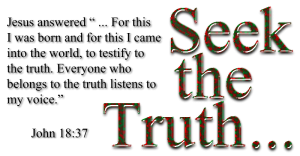What is Christianity?
| Christianity is about God reaching out his hand in friendship to mankind. Christians believe that the whole world and everything in it was created by God. God is a personal being, a living God who is three, yet one: Father, Son and Spirit, just as we human beings have body, mind and soul! (see the Trinity).
The Bible says God created people in his image, to love him. Yet every person has rebelled against God and sinned. Yet instead of turning his back on us, God became a man, Jesus, who most scholars believe was born about the year 4 BC and lived among us. He taught a message of love throughout Palestine but public opinion turned against him and he was executed as a young man.
He died because of us - the death that we should have died. He was crucified on a cross, but he rose from the dead, and now calls us to trust him, to love him and to repent of our rebellion. If we do this, then we our relationship with God becomes restored and we will live forever with God.
Many non-Christians may think that being a Christian is about belonging to a particular church or following a certain set of rule. Most Christians however would agree that at its root, being a Christian means to be in a living relationship with Jesus.
Who is God?
|
|
|
Devotion Of The Day
|
 Beautiful beach and mountains
March, 3 - Daily Devotions
March Scripture Portion for Bible Commentary Deuteronomy 25 - 1 Samuel 29 including the books of Book of Joshua, Judges and Ruth
Only Moses, Caleb, and Joshua remain of the old generation; and in today's reading Moses gives his final words to the people. He explains that he would not be able to lead them any longer, because of God's judgment. He knew he would not enter Canaan; yet he did everything possible to enable Israel to enter! Of course, Moses was faithful for the Lord, and this is why he was so faithful to Israel. Moses gave the people the wonderful promise of God's victorious presence in chapter 31:6, and to Joshua in verse 8 of the same chapter.
In these final chapters of the Book of Deuteronomy, we see a new leader (chapter 31), a new song (chapter 32), a new blessing (chapter 33), and a new home (chapter 34).
Moses was the greatest of Israel's prophets. Chapter 34:10 says, "And there arose not a prophet since in Israel like unto Moses, whom the Lord knew face to face." Moses had a special homegoing, and he was honored by being the only man the Lord buried.
The people of Israel are now ready to enter and claim the land. This will be our basic study in the Book of Joshua.
|
|
Note to users: The wiki is currently operating in safe mode. Editing is limited to users with certain privileges in order to deal with spam. You can create a new user account, and confirm your email ID in order to obtain ability to edit pages. Learn how to be an editor or sysop at WikiChristian.
|
|
Note to users: The wiki is currently operating in safe mode. Editing is limited to users with certain privileges in order to deal with spam. You can create a new user account, and confirm your email ID in order to obtain ability to edit pages. Learn how to be an editor or sysop at WikiChristian.



